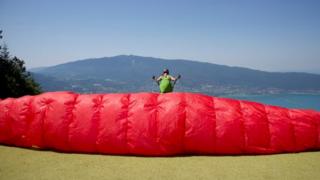‘I woke up to thousands of messages from Malaysia’

Image copyright
Luis Parsons
London-based artist Laura Melissa Williams woke up one morning last week to find thousands of messages for her on social media – all from Malaysia.
Overnight, the thirty-something Briton, who paraglides as a hobby, had accidentally caught the attention of the nation’s teenagers.
They are in the process of taking SPM exams, roughly the equivalent of GCSEs.
And one of the English comprehension questions was about a fictional paraglider called Melissa.
Image copyright
laura melissa williams
The question described the fictional Melissa hitting a storm-cloud – like “being tossed around in a washing machine” – and having to be rescued from the roof of a farm by villagers.
Following the exam, a student looked up the question on the internet, found Ms Williams (whose middle name is Melissa), realised from her social media she was a paraglider – and the hashtag “The real Melissa” was born.
“It’s a bizarre set of coincidences that created the perfect storm and then went viral,” Ms Williams told BBC News.
It began with a whirlwind of humorous memes about washing machines and farms.
“At first, I thought it was funny,” she said.
Some thought Ms Williams was somehow working with the Malaysian government.
But as the day wore on, some of the comments became more personal and nastier – along with sarcastic posts about whether “Melissa” should have been paragliding in the first place.
“I checked with some Malay-speaking friends as I started worrying, I got a bit concerned about any threats – they just said it was mainly immature,” she said.
And then overnight in UK time, Ms Williams found herself the subject of another hashtag: “Stop cyber-bullying Melissa”.
Word had reached Arwind Kumar, a social-media influencer with nearly 200,000 subscribers on YouTube.
And he had posted a video about Ms Williams in which he said: “There is a fine line between making a joke and being extremely rude.”
Image copyright
Arwind Kumar/YouTube
And from then on, Ms Williams said, apologies had flooded in.
“I awoke to thousands of messages of apology, from students across Malaysia – some of whom posted nasty comments originally and now regret it and some who apologised on behalf of their cohort,” she said.
She has since received invitations to go to dinner in Malaysia, offers of gifts, and apologies from school teachers, influencers and the media. A female Malaysian paraglider got in touch to ask if they could take a flight together.
“For me that’s the most amazing thing about this – that the tide turned,” said Ms Williams, who doesn’t currently have plans to visit the country.
“You hear stuff in the media about celebrities being bullied and that’s the immediate thing that comes to your head, that it’s a bunch of 17-year-olds who got carried away, but that’s the problem – it’s group behaviour, people don’t stop and think.”
In total, she has now received 210,000 Instagram messages, 30,000 tweets, countless direct messages and she has also acquired 5,000 new followers.
“I now have an army of people as my protectors and standing up for what is right and moral,” she said.
Ms Williams is now considering creating an art exhibition based on her experience.
Surprisingly, it’s not the first time this has happened – the SPM exam in 2018 featured a question about a fictional surfer named Sarah, which propelled Malaysian surfer Sarah Faudzi to Instagram stardom.
In September, Malaysia’s queen, the Raja Permaisuri Agong, returned to Twitter in order to express disappointment the police were arresting people who had insulted her on social media.
“I am truly upset that the police have detained those people. Through the years, my husband and I have never made any police report on bad things said about us,” she wrote, according to the Straits Times newspaper.
The tweet has now been deleted.



0 comments